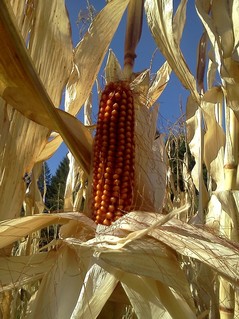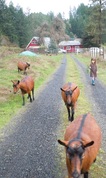
We are located in Noti, Oregon on the Long Tom River. Gardens rotated through the farm provide the family's vegetables and produce surplus for market offerings, canning and root cellar storage.
A small portion of our pasture is converted to field corn each year, then used for vegetables or improved pasture seeding in subsequent years. The corn variety we grow is Floriani Red Flint, a heirloom from Northern Italy. Each year we hand harvest, husk and shuck the corn. We only select the highest quality kernels to be ground into our whole grain polenta, which is available year round. The remaining corn is cycled through our free ranging poultry.
A small herd of Irish Dexter cattle are rotationally grazed through our pastures and are the center of our fertility program. The herd is followed in spring, summer and fall by our portable coop which houses our flock of laying hens. This system aids the cattle by reducing parasites while supplementing the hens diet, reducing the need for grain and fertilizing the pasture. During the winter months when soil microbes are dormant and relentless rains could potentially create polluting manure runoff, our cattle are tucked cozily in a dry barn. Their dry bedding is the carbon portion of our compost and is spread in the spring.
(This was written in 2012, when we tried to do it all. We no longer have Dexter cattle & milk goats and we no longer grow grain corn. We thought we could do everything. We have focused our passion towards growing vegetables and berries.)
A small portion of our pasture is converted to field corn each year, then used for vegetables or improved pasture seeding in subsequent years. The corn variety we grow is Floriani Red Flint, a heirloom from Northern Italy. Each year we hand harvest, husk and shuck the corn. We only select the highest quality kernels to be ground into our whole grain polenta, which is available year round. The remaining corn is cycled through our free ranging poultry.
A small herd of Irish Dexter cattle are rotationally grazed through our pastures and are the center of our fertility program. The herd is followed in spring, summer and fall by our portable coop which houses our flock of laying hens. This system aids the cattle by reducing parasites while supplementing the hens diet, reducing the need for grain and fertilizing the pasture. During the winter months when soil microbes are dormant and relentless rains could potentially create polluting manure runoff, our cattle are tucked cozily in a dry barn. Their dry bedding is the carbon portion of our compost and is spread in the spring.
(This was written in 2012, when we tried to do it all. We no longer have Dexter cattle & milk goats and we no longer grow grain corn. We thought we could do everything. We have focused our passion towards growing vegetables and berries.)

A small herd of dairy goats complements the grazing habits of the cattle, improving pasture health and providing fresh raw milk for the family.
Perennial plantings of berries, fruit trees and herbs round out the farms production while reducing the need for machinery and excessive tillage.
We are proud to be Certified Organic by Oregon Tilth.
Perennial plantings of berries, fruit trees and herbs round out the farms production while reducing the need for machinery and excessive tillage.
We are proud to be Certified Organic by Oregon Tilth.